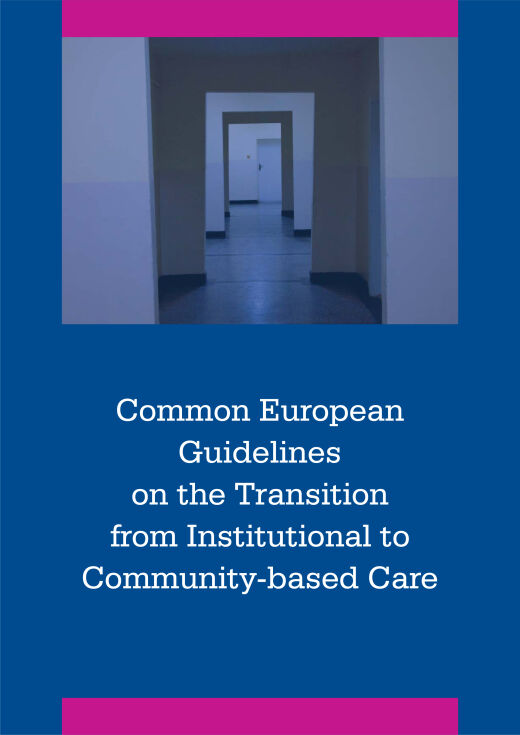Good practice guide on the transition from Institutional to Community-based Care.
The Common European Guidelines on the Transition from Institutional to Community-based Care provide practical advice about how to make a sustained transition from institutional care to family-based and community-based alternatives for individuals currently living in institutions and those living in the community, often without adequate support.
The Guidelines are aimed primarily at policy and decision makers in the European Union and the neighbouring countries with responsibility for the provision of care and support services for children, people with disabilities and their families, people with mental health problems and older people.
Across the European Union, hundreds of thousands of people with disabilities, mental health problems, older people or abandoned and vulnerable children live in large segregating residential institutions.
Such institutions were originally created to provide care, food and shelter, but by now evidence has shown that they cannot ensure person-centred services and appropriate support needed to bring about full inclusion. The physical separation from communities and families severely limits the capacity and preparedness of those living in or growing up in institutions to participate fully in their community and wider society.
The shared European values of human dignity, equality and the respect for human rights should guide us as our societes develop structures of social care and support fit for the 21st century. The European Commission takes an actve role in helping the less advantaged. The Europe 2020 strategy has set ambitious targets for inclusive growth requiring acton to be taken to promote integration and adequate livelihood of poor and excluded people.
The present Guidelines and Toolkit are the result of an initative taken by our predecessor, Vladimír Špidla, then EU Commissioner for Employment, Social Affairs and Equal Opportunites. He initated to set up a group of experts on the Transiton from Insttutonal to Community-based Care and asked them to report on basic principles and priority recommendatons. Key among those recommendations was the need to develop detailed common European Guidelines and a Toolkit on the Transition from Institutional to Community-Based Care which now have become reality after a year-long process of consultation and gathering of good practice and expertise from across Europe.
But with this important milestone achieved, the implementaton of adequate reforms of care systems needs to take place in Member States. The Commission will support those efforts by contnuing the monitoring of the recent trends in poverty and inequality while forecastng the implicatons of policy measures. This is done as part of the Europe 2020 strategy during the so-called European Semester. This process helps assistng Member States in carrying out structural reforms that promote inclusive growth. The Structural Funds make an important contributon to implement these reforms, support social economy and more efficient policies. Furthermore, for the next financing period the Commission has proposed minimum shares per category of regions resultng in at least 25% of cohesion policy resources to human capital and social investment by the ESF, and at least 20% of this amount to social inclusion. De-institutonalisaton is one of the proposed priorities.
We congratulate the authors on this very welcome publicaton which will serve as an extremely useful input as regards the use of structural funds for de-insttutonalisaton both in the current and also in the new 2014–2020 programming period.
László Andor, Commissioner for Employment, Social Affairs and Inclusion
Johannes Hahn, Commissioner for Regional Policy
Read and download the free pdf in your browser, link below.

The publisher is the European Expert Group on the Transition from Institutional to Community-based Care. Common European Guidelines on the Transition from Institutional to Community-based Care © European Expert Group on the Transition from Institutional to Community-based Care 2012
community, Deinstitutionalisation, disability, intellectual disabilities, Person-Centred Planning, Personalised Support, Self-Directed Support, social care, Europe, Paper